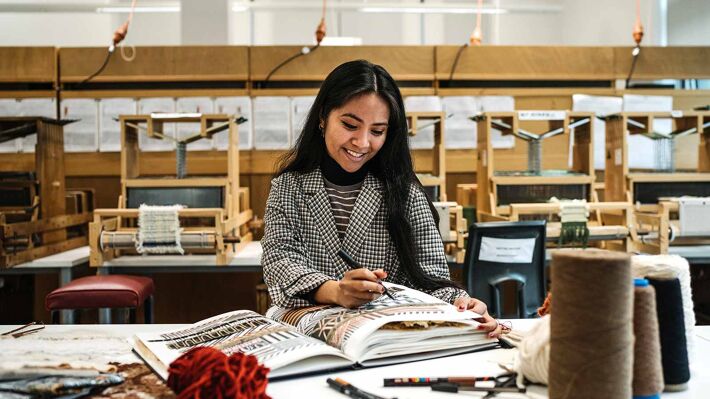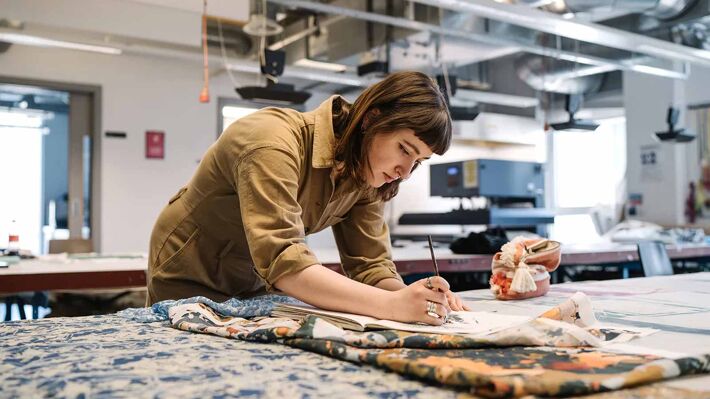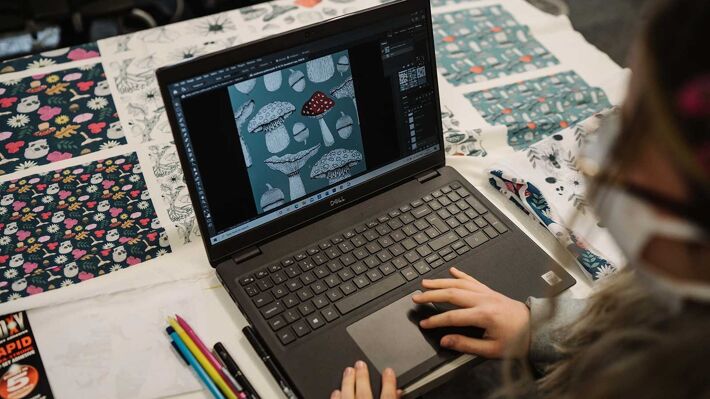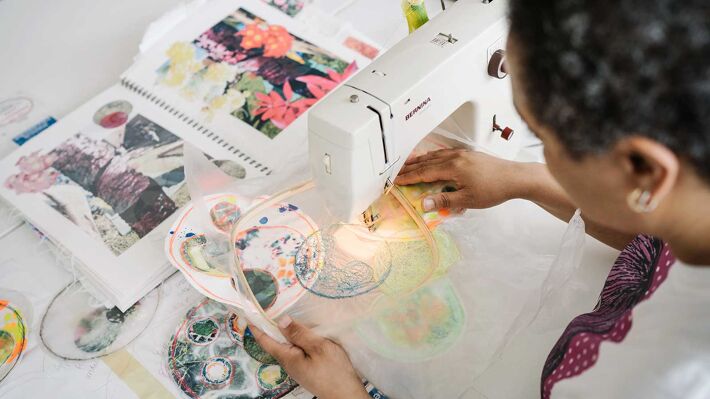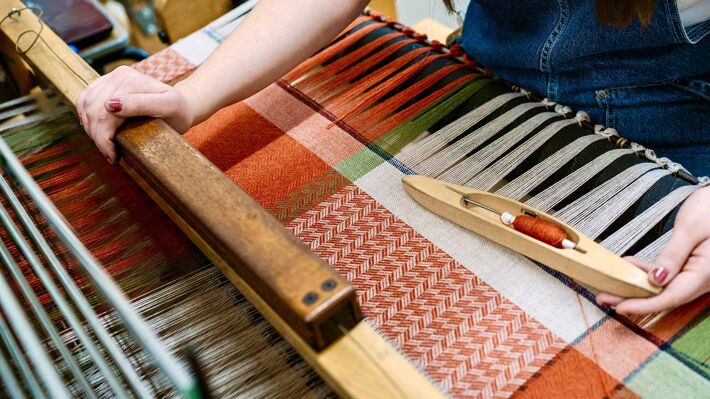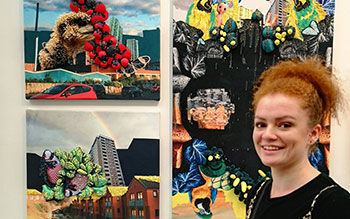Textile Design with a Foundation Year - BA (Hons)
Currently viewing course to start in 2026/27 Entry.
Textile Design explores the potential of fibres, yarns and processes to create cloth and materials with distinctive qualities and properties. It is a highly creative field with the potential to impact and enrich all aspects of our lives....
- Level Foundation
- Study mode Full Time
- Award BA (Hons)
- Start date September 2026
- Fees View course fees
- Subject
- Location City Centre
This course is:
Open to International Students
Overview
Textile Design explores the potential of fibres, yarns and processes to create cloth and materials with distinctive qualities and properties. It is a highly creative field with the potential to impact and enrich all aspects of our lives. Knowledge in this area is key in making informed choices that will reduce the environmental and social impact of products, and can be used artistically to raise awareness and inspire behavioural change.
Our course nurtures fresh thinking and industry-ready designers and practitioners with expertise in the craftsmanship of Textile Design across the disciplines of Print, Weave, Knit, Embroidery and Material Innovation. The exciting potential of cross-disciplinary practice is supported and encouraged, giving you the option to either specialise or combine disciplines, embracing both digital technologies and traditional craft skills.
The Foundation Year is an exciting step towards your chosen creative degree pathway. You will embark on a fun, creative year of discovery. An opportunity to innovate, experiment, develop craft and research skills, equipping your professional journey into the creative industries.
We will support you to become part of the Birmingham City University’s Fashion & Textiles community, where you can fully explore yourself within an inclusive environment, amongst a likeminded and diverse peer group. Our bespoke course encompasses Fashion Design, Textile design, Fashion Business and Fashion Communication degree routes. Providing you a platform to collaborate, share and learn from others. You will develop visual communication, subject specific craft skills, and processes to build confidence and independence ready for the next stage of your degree. We aim to innovate, excite, engage, and challenge you. Inspiring and encouraging you to develop your personal aesthetic, offer sustainable awareness, and ignite a lifelong enthusiasm to learn. We are proud to see our foundation students continuing to thrive as they progress through the degree pathways and graduate as leaders within the industry.
As you progress onto the degree programme, through experimentation in dedicated textile workshops equipped with cutting-edge industry facilities you will develop the specialist skills, knowledge and experiences required to thrive in a growing field of industry roles and opportunities. Creative play and problem-solving is at the heart of learning and you will be guided by passionate and experienced staff as you discover your own personal expression through the language of design – colour, pattern, surface, texture and im-age. Birmingham is a vibrant and multi-cultural city providing exposure to diverse perspectives and opportunities. Our inclusive creative community prioritises and celebrates individuality, empowering and supporting you to embrace and embed this within your practice.
Career-focused teaching, industry live-briefs and integrated work-placements within the first two years of study will support you in identifying professional aspirations amongst the breadth of opportunities within textile design industry and other related fields. Choice points help you focus your experience and collaborative opportunities build your confidence and professionalism. You will develop a portfolio of responsible and future-thinking design concepts to drive the industry’s transition to a circular sustainable economy and build healthy communities.
In your final year, you will have the autonomy to celebrate your individual practice and interests. Our Next Step module at the end bridges the gap between study and industry, helping you plan to achieve your ambitions within the support of your university network.
You will graduate with a clear vision of where you personally fit in the industry and a tailored professional portfolio to get started. Our award-winning graduates emerge as innovative practitioners leading the way working for prestigious established brands or as influential entrepreneurs. They are in a wide variety of fulfilling and meaningful roles, shaping interior, fashion and cultural landscapes as Designers, Brand owners, Artists and Researchers.
What's covered in this course?
We work with you during studio sessions in a variety of ways and you will be supported by a highly skilled technical team who manage the workshops and deliver technical demonstrations. Your timetables enable you to manage self-directed study resourcefully in relation to module deadlines.
With no house style we encourage you to embrace digital technology and traditional craft skills to enable your creativity, personal talents and professional awareness to be developed throughout the course in relation to career ambitions.
Our unique Next Step module prepares you and your graduate profile to bridge the gap between study and industry, whether as a designer maker, a trend Consultant, visual merchandiser, studio designer or in another relevant role.

Throughout the course we've learnt a variety of skills both creative and transferable. To open our minds and really 'think outside the box' is at the heart of our design work. Through our placements we undertook on the course, we have become more prepared and experienced and ready to adapt to working life and to reach the highest level of professionalism we wouldn't have achieved otherwise.
Holly Lloyd Williams, Textile Design
I'm so glad that I did the foundation course here because it is a great stepping stone before the degree level and I think I came into my first year feeling much more confident than I ever would have done if it wasn't for the foundation year. It definitely prepared me for beginning my degree course.
Lucy Ettinger, Foundation Year
Why Choose Us?
- The foundation year will enable you to explore all of the different degree pathways to help you choose the right course ready for the step up to degree.
- We are the first University in the country, and second in the world, to have Coloreel embroidery technology which allows students to explore modulated colour change within their design work. This opens up new creative possibilities whilst increasing the efficiency and minimising thread waste.
- On the foundation course you will be part of a community, building your knowledge of the equipment and facilities available, getting to know staff and your fellow students through social events and our end of year exhibition.
- You are supported every step of the way! Our friendly academic and technical teams will encourage your creative individuality. Personal tutorials ensure you can regularly discuss your progress and career aspirations.
- Our cutting-edge facilities comprise of industry-standard technology and equipment to ensure you are developing professionally relevant skills and awareness.
- Live briefs expose you to leaders in the design field and help you develop important collaborative skills and industry networks.
- We support you in entering key national competitions such as the Bradford textile society design competition, Hand & Lock prize for embroidery and Idott to get your CV looking sharp.
Open Days
Join us for an Open Day where you'll be able to learn about this course in detail, chat to students, explore our campus and tour accommodation. Booking isn't open for the next event yet. Register your interest, and we'll let you know as soon as booking goes live.
Next Open Day: Friday 26 June
Entry Requirements
Essential requirements
80 UCAS Tariff points. Learn more about UCAS Tariff points.
If you have a qualification that is not listed, please contact us.
Fees & How to Apply
UK students
Annual and modular tuition fees shown are applicable to the first year of study. The University reserves the right to increase fees for subsequent years of study in line with increases in inflation (capped at 5%) or to reflect changes in Government funding policies or changes agreed by Parliament. View fees for continuing students.
Award: BA (Hons)
Starting: Sep 2026
- Mode
- Duration
- Fees
- Full Time
- 4 years
- £9,535 in 2026/27 ✱ Important note for this price
- Apply via UCAS
(↩Back to price) * The Government is proposing to apply an inflationary increase to regulated tuition fees for 2026/27 and the University is planning on increasing fees to that maximum level once confirmed.
International students
Annual and modular tuition fees shown are applicable to the first year of study. The University reserves the right to increase fees for subsequent years of study in line with increases in inflation (capped at 5%) or to reflect changes in Government funding policies or changes agreed by Parliament. View fees for continuing students.
Award: BA (Hons)
Starting: Sep 2026
- Mode
- Duration
- Fees
- Full Time
- 4 years
- £18,570 in 2026/27
Guidance for UK students
UK students applying for most undergraduate degree courses in the UK will need to apply through UCAS.
The Universities and Colleges Admissions Service (UCAS) is a UK organisation responsible for managing applications to university and college.
Applying through UCAS
- Register with UCAS
- Login to UCAS and complete your details
- Select your course and write a personal statement
- Get a reference
- Pay your application fee and submit your application
You are not required to submit a portfolio for this course.
Course in Depth
Foundation year
In your Foundation Year, you will gain a grounding in a variety of skills from each of our degree pathways, including blog writing, textile techniques, branding, creating garments and more. You will be able to explore the Fashion and Textiles workshops and CAD suites to pursue your individual interests.
In order to complete this course you must successfully complete all the following CORE modules (totalling 120 credits):
As part of the fashion and textiles industries it is vital that you are able to utilise visual and written communication to convey a narrative. In this module you will learn about visual communication and specifically how it applies to these industries. You will learn key transferable skills that you can utilise in your degree pathways and in your future career.
Whether you are a fashion design, textile design, fashion business and promotion or fashion branding and communication student it is important that you understand the key construction and processing skills relevant to the Fashion and Textiles industry. In this module we will show you how these key skills inform your degree pathway and future career.
Trend forecasting is a global industry developed to research and formulate predictions to inform brands and retailers on what products should be designed and sold.
This module you will focus on techniques and strategies for identifying, researching, and documenting trends, and how trend analysis can be used in professional practice. You will analyse what a trend is, exploring past, present, and future trends using a variety of sources. Researching an existing trend and communicate your findings.
This module will allow you to develop an understanding of how the world and lifestyles are changing, and how fashion and textiles respond to these changes. Through lectures and workshops, you will be introduced to a range of themes, discussion topics, exploring social and industrial changes, and their impact on society. You will develop skills and understanding of a fashion business through the set-up and development of a brand.
This module will allow you to plan, develop and deliver a project that draws on your own, personal creative strategies, it is your chance to show off a range of skills that embrace a plethora of ideas and concepts. This is an opportunity to showcase your personal design style and produce a body of work that will enhance your next steps onto your degree programme.
Year one
Guided and encouraged by an experienced teaching team, engaged in current research or practice, and through workshop experiences supported by e-learning, you investigate key areas of weave, knit, embroidery and printed textiles before choosing one or two technical areas to explore in the first year of the course.
In order to complete this course a student must successfully complete all the following CORE modules (totalling 120 credits):
In this module you will explore the connections between the creative fashion and textile industries in the past, and how this informs present and future trends. You will be introduced to the way individuals have influenced culture, freedom of expression and experimentation, and how this pushes boundaries and explores identity.
Through reflection you will analyse your research and the connections that you discover, developing core skills and communicating your findings and ideas through the use of industry-standard software.
Shared content is delivered via blended learning, this is underpinned by your course-specific content which is delivered on campus.
Textiles for Fashion: Print & Knit 20 credits
This module continues to focus on experimentation with materials, processes and colour to build core skills and your awareness of the scope of our discipline. It introduces you to the other key approaches to textile design – Embroidery and Weave.
Embroidery can be more about image, surface and textural qualities, and woven textiles is more about fibre, yarn and structure. As with the previous module, the contrasting experiences will help you to discover where your strengths and interests lie, whilst continuing to design with the world of fashion in mind.
The ability to put original ideas into an effective repeating pattern is core knowledge demanded by industry, and this module introduces you to the world of pattern creation, looking at compositional structures, theories, and the impact of colour, scale, rhythm and balance.
There are a variety of textile-specialist software and equipment involved in textile design and production and digital technologies have a key role to play in reducing the resources involved in the sampling and development. Adobe Photoshop remains the key program for pattern creation.
You will start the module by forming a personal concept and generating original, versatile imagery for pattern exploration. You will then test a range of compositional structures and problem-solve ideas using paper-based and digital approaches, including tablet-based drawing programs, Adobe Photoshop and AI.
Industry needs creative problem-solvers who can help implement sustainable design strategies that ensure that people and planet are considered equally alongside profit.
For this module your starting point will be a tailored garment. You will begin by considering its likely production journey, undertaking research to explore its potential social and environmental impact. You will use a lifecycle approach and learn about systems-thinking to gain awareness of the complex nature of our industry and the different sectors that exist within it. You will also see that the decisions textile designers make can make a significant impact in minimising a products negative impact.
Year two
In your second year, you explore trends and predictions in fashion and interior industries and explore the scope of career sectors and job roles open to textile designers.
You shape your learning by choosing from a range of industry-focused and entrepreneurial design challenges and build professional experience through a collaborative design challenge or work experience – all designed to help you identify your strengths and career interests.
In order to complete this course you must successfully complete all the following CORE modules (totalling 100 credits):
This level 5 undergraduate module is designed to equip students with the essential skills and knowledge necessary for a successful transition into the industry work placement and beyond. The module focuses on cultivating a deep understanding of professional practices, industry expectations, and personal development strategies.
Through a combination of theoretical knowledge, practical exercises, case studies, and industry guest lectures, this module provides students with a solid foundation for their future careers empowering them to thrive in a competitive and dynamic industry landscape.
Level 5 is all about EXPLORATION. There are lots of exciting sectors, markets and job roles open to Textile Designers, each involving slightly different challenges, work requirements and skill sets. There is a demand for designers who can help drive change to build an industry that is sustainable and contributes to an inclusive and equitable society.
This module focuses on Birmingham and the West Midlands offering a range of mini-briefs that simulates different design sector scenarios to help you begin to consider your place within industry and the contribution you can make.
Industry wants confident, informed, original thinkers who have the capacity to be both imaginative and pragmatic. What is your skill or what do you want to be known for? What have you been introduced to so far that you are curious to revisit and take further? What talent have you discovered that you want to nurture?
In this module you will identify your strengths and interests to build distinctiveness and originality to your creative practice and portfolio.
In order to complete this course a student must successfully complete at least 20 credits from the following list of OPTIONAL modules:
The purpose of the work placement module is to enable you to develop professional attributes and subject skills through experience in the work place, and to critically reflect upon your learning in that context. You will normally be expected to arrange your own placement, with support from academic staff and BCU Careers.
This module provides an opportunity for you to apply your knowledge and skills to an external, professional brief. The brief will be set by or in discussion with an external client/agency/community and could be a ‘real life’ problem to be solved, or a simulation. The resulting project should consider sustainability and address relevant UN Sustainable Development Goals as a key aspect of contemporary creative industries work. The module provides an opportunity for you to engage in a responsive, imaginative and professional manner with an aspect of your subject area, which contributes to the development of employability skills within the supportive infrastructure of the University. You will collaborate with students, and where relevant with other stakeholders, and will be supported to approach the project with curiosity, openness, critical thinking, innovation and practical and technical skills, in order to produce project outcomes and/or solutions which meet the required brief.
Creative careers can take people to a wide variety of, sometimes, unexpected destinations. Learning to see and exploit opportunities can be the key to a rewarding portfolio career making good use of your creative skills whilst earning a living from doing what you love, whether it's producing creative artefacts, performing, offering a service or consultancy. Learning to promote and ‘pitch’ those ideas to others is core to developing a successful independent, creative and entrepreneurial career. This module will build your skillset to enable you to talk confidently about you and your work. It will also help you to find or create opportunities, some may even come as a surprise to you!
Core modules are guaranteed to run. Optional modules will vary from year to year and the published list is indicative only.
Year three
Your final year gives you the opportunity to hone your portfolio and experience to suit your career ambitions through focused projects.
In order to complete this course you must successfully complete all the following CORE modules (totalling 120 credits):
This Level 6 undergraduate module is designed to further develop your research and inquiry skills within the context of the fashion and textile industry.
You will undertake a range of research methods on a topic of personal interest. You will investigate and critically analyse the findings. You will be applying a reflective comment to the evidence to deepen your understanding of your field and considering real-world challenges in the industry.
You will present conclusions and recommendations in a proposal that feed into an independent project.
Building on the research you have undertaken in the previous module, in this module you will write and execute a practical brief, one that enables you to immerse yourself in the materials, processes and approaches that make you shine and generates portfolio content that targets your career ambitions.
This module is about selecting and progressing key ideas from the portfolio of work presented in the previous module, undertaking focused design development to realise their potential as impactful resolved design statements. This may involve problem-solving aspects like: material sourcing, scale, composition, colour and application.
What now? What next? This module is the culmination of the research and design outputs of the last three modules and provides a supportive space to plan your transition between education and employment. In this module you will, strengthen your portfolio, build an online promotional presence and formulate an action plan, all designed to help you navigate the next step towards your career ambitions.
Download course specification
Download nowCourse structure
The Foundation year encourages experimentation and play whilst exploring a breadth of skills to help you with your step up to your degree.
Year 1
The first year is all about experimentation! You will engage with different approaches to drawing and idea generation, learn in depth about materials, composition and colour in relation to textile design, and be challenged with working to your first client brief. You will be introduced to our workshops to learn and sample in the areas of woven, knitted, embroidered and printed textiles, as well as MAT_er.LAB, our biomaterials experimental laboratory space. You will identify the technical language (or languages) that best suit your skills and interests.
A contextual lecture/ seminar programme builds knowledge of historical textiles which provides the vital reference points needed within contemporary design as well as critical thinking skills.
Year 2
In your second year, you will extend your technical skills while beginning to understand the scope of career opportunities open to you. You will start the year by learning about key industry sectors and developing a personal CV and creative promotional material to help you establish your areas of interest.
You will then be introduced to and choose practical design challenges from across five key employment sectors which have been designed to help you consider your place within the industry:
- Bespoke Fashion Textiles
- Contemporary Culture and Craft
- Retail and Promotion
- Styling and Trend Forecasting
- Surface Pattern and Technologies
You will study market and client awareness, trends in both fashion and interior design sectors, commercial considerations with industry-facing projects as well as business principles, ethics and sustainability issues.
You can then choose to end the year by undertaking a professional Work Placement, Collaborative Practice or Live Brief experience, building your knowledge in the workplace or working alongside other creative students from across the Faculty.
Year 3
In Year 3 you will continue your design journey in relation to your chosen career pathway and through your choice of textile language, but with a much more independent and self-directed focus.
You will begin by writing your dissertation around a subject of interest. This will often kickstart themes and concepts that can form the basis of practical work to follow.
The final project is split into two modules, to help structure the experience. You will firstly engage in broad and personal contextual research to inform and inspire you in creating a professional portfolio of extended design work and resolve a creative brief that is aligned with your creative ambitions.
Our unique Next Step module then equips you with all you need to make the leap into employment or postgraduate study. You will create an action plan, extend your portfolio through targeted competition entries and promote your strengths and achievements via digital platforms – all designed to help you leave confident in pursuing your career ambitions.
The learning environment
The learning environment includes a wide range of learning and teaching methods, an experienced teaching team engaged in current research/practice, and studio/workshop experiences supported by e-learning. There is access to both digital technology and traditional textile craft workshops. Equipment includes a Mimaki digital printer, jacquard loom, computerised AVL studio looms, digital embroidery machines and laser cutting equipment, in addition to traditional facilities including print tables, transfer press, knitting machines, looms and rug tufting guns.
Supportive tuition in specialist and combined groups throughout the course fosters the interchange of ideas. The diverse experience of the academic staff reflects the course ethos – all are practising designers/visual artists, many working internationally.
The course actively fosters links with organisations (including museums and galleries) and industry, providing a continuously updated contemporary educational experience.
Studio activities
Practical drawing sessions help to get design projects underway in a friendly and supportive environment, building your skills and confidence by sharing and learning as part of a peer group.
We help to prepare you for the real world by running design projects as if in a commercial studio. With role-play sessions, reviews and critiques, you get the opportunities to test your professional networking skills, ready to take to your perfect job.
Working alongside friends to learn and understand the subject of textiles in relation to the wider industry you will participate in seminars to discuss contemporary design issues, such as ethical fashion, global trends and international manufacturing, while working out what makes you tick.
Discover the community in the College of Jewellery, Fashion and Textiles where our students talk about their journeys here at BCU which has inspired creativity and innovation.
Foundation student project
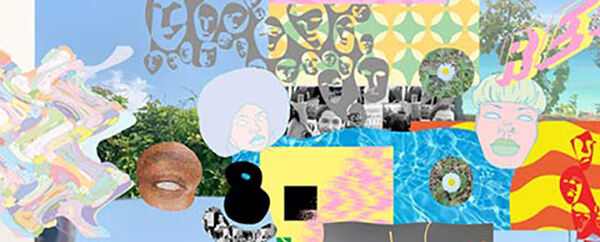
Students on the Fashion and Textiles Foundation took part in The Signature Project where they used personal creative strategies to show off a range of skills and showcase their personal design style in preparation for the next step of their chosen degree.
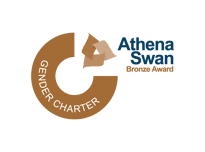
Athena Swan Bronze Award
Our Jewellery, Fashion and Textiles courses have been awarded the Athena Swan Bronze Award for our commitment to Equality, Diversity and Inclusion (EDI).
Athena SWAN is a quality charter mark framework and accreditation scheme established and managed by the UK Equality Challenge Unit in 2005 that recognises and celebrates good practices in higher education and research institutions towards the advancement of gender equality: representation, progression and success.
Employability
Enhancing your employability
Our BA (Hons) Textile Design degree is designed to ensure you have the skills, vision and creativity to appeal to a range of employers.
With strong understanding and skills in traditional and digital design, you will become adept at a number of textile processes, including print, embroidery, weave and knit. You’ll also gain a clear vision of where you fit in the industry in order to build a strong personal and professional portfolio, using promotional and marketing skills you’ll be prepared to take to future job roles.
Links to industry
The College of Fashion and Textiles works with local, national and international businesses to enhance student learning through placements, workshops, live briefs and guest lectures from industry professionals.
Our Graduates
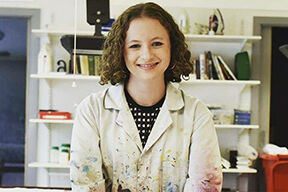
Rebecca Lewis
Since graduating I have interned with Next menswear in the Print and Graphics Department. My internship with them came after my work was recognised at the 2018 New Designers exhibition, a hub for textile graduates to exhibit their work and make valuable contacts within the industry. The design department at Next contacted me directly after the exhibition and offered me the place.

Kate Hollowood
My current role is designer maker and company director of my company, Kate Hollowood Design. I work for myself and am currently the only employee, meaning I am responsible for everything involved in running a creative business; from making accounts to following up leads and attending trade shows as well as admin, pricing, quotes, diary bookings, product development and marketing…. the list goes on!

Gabbie Armstrong
I was lucky to have a part time job in the fashion industry during my final year at university. It wasn’t easy to juggle work and study commitments at the same time but I was dedicated to building my career as soon as I could.
The trainee position at Outfit Fashion helped me to understand the company’s structure and the different roles I could have in the industry, but most importantly I learnt about applying the principles of buying/merchandising and design that I had been learning throughout the course. Once I graduated the position became a full time role and I was able to develop my skills within this field even further.
Chloe Frost
Assistant Editor - Stylus
Watch the video below to find out how Chloe's time on our BA (Hons) Textile Design course helped her discover her dream career.
Textile Design Career Paths
Graduate Sophie Hawkesford offers an insight into the wide range of career paths that are accessible with a textile design degree.
Follow us on Instagram @TextilesBCU
There’s no better way to see what our students are creating. Instagram was made for beautiful images, so take a look at ours.
Facilities & Staff

Our Facilities
Fashion and Textiles courses are based at our Parkside Building, which is part of our multi-million pound City Centre Campus development in the heart of Birmingham's Eastside development.
Our staff
Louise Martin
Lecturer in Foundation Year Fashion and Textiles
Louise’s Masters in textile design established the foundation for her design journey. From this platform, Louise started to build a career as an interior designer, regional design manager, stylist, and as a lecturer in fashion and textiles. Louise now has over 10 years' teaching experience as a lecturer.
More about LouiseNatalie Martin
Course Leader in Foundation Year Fashion and Textiles
After graduating with BA (Hons) Fashion Design from BCU Natalie has worked with brands such as Joseph Turvey and Hades Knitwear as a freelance designer, production assistant and illustrator as well as working on show production for presentations at London Fashion Week Mens. Working hands-on with small, luxury brands has enabled her to gain a...
More about Natalie